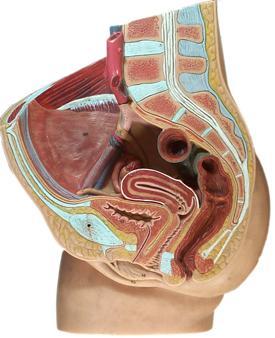
Image adapted from EUSKALANATO under a Creative Commons license: BY-NC-SA.
This sequence provides the information and opportunities necessary for students to acquire integrated knowledge of the structure and function of the endocrine and reproductive systems in humans. Although all of the biological systems are clearly interrelated, the endocrine and reproductive systems are intimately linked. Much of what you learn about hormonal control and steroid biochemistry of the endocrine system will be referred to and used in teaching reproductive physiology.
Sequence Director:
Richard Mortensen, M.D.
dScribes:
Zanna Pillars
Sarah Sophia Na
Syllabus
Introduction and Broad Objectives
The goal of this sequence is to provide the information and opportunities necessary for students to acquire integrated knowledge of the structure and function of the endocrine and reproductive systems in humans. Ultimately, the goal is for students to acquire competence in these subject areas in order to practice scientifically-based medicine. Like other sequences this year, we will teach through a series of lectures, laboratories, and small group sessions.
Although all of the biological systems are clearly interrelated, the endocrine and reproductive systems are intimately linked. Much of what you learn about hormonal control and steroid biochemistry of the endocrine system will be referred to and used in teaching reproductive physiology. You should also note that much of the relevant biochemistry for carbohydrate metabolism has been taught in the GI sequence, and will be referred to during endocrine physiology.
The Longitudinal Case for this sequence addresses infertility; specifically treatment of an infertile heterosexual couple and the ethics associated with infertility treatment. The case will also address how reproductive anatomy, histology, and physiology assist in diagnosis and treatment decision-making. In addition to the Longitudinal Case, there will be another clinically-based educational opportunity: a multidisciplinary conference with patient presentation.
Texts
In addition to the texts that you have used throughout the year in previous sequences, there is a reproductive physiology chapter that is required for this sequence. This chapter will be on electronic reserve and you can access through Ctools.
Sequence Examination and Grading
Performance will be assessed by a Friday quiz and a comprehensive final examination. The quiz will be on-line and will consist of multiple choice type questions, and will cover material up to and including that day’s material; i.e., through Regulation of Growth on Jan. 30th. The final exam will include both written (i.e., on-line) and practical portions. The examination for gross anatomy will include a practical exam as well; which will be conducted in the gross anatomy laboratories on Friday, Feb 6th. All exam questions weigh equally and are worth 1 point. To pass the sequence, students must achieve a minimum average score of 75% on the quizzes and final exam as usual, and fulfill all other requirements of the sequence.
Reviews
There will be no formal review sessions during this sequence. As in past years, we will use the “Continuous Clarification Process” (CCP). Students wanting further clarification of concepts from lecture, lab, and/or readings should email the sequence director at any time during this sequence. The appropriate faculty member will post an answer/discussion to the question on-line in the Announcements Area of the Portal.
Mandatory Lectures and Small Group Sessions
In the Endocrine/Reproduction sequence there are several required experiences. In the RARE circumstance where a student cannot attend, the student must contact their class counselor in advance (or as soon as possible in an emergency) to request a deferral. (Please do NOT contact sequence directors with requests for or explanations of deferrals.) Absences will be approved or denied by class counselors based on the same guidelines used for Quiz and Exam deferrals. Should you obtain a deferral from your class counselor, make up instructions for the required experiences (found below) should be followed.
For the required small group sessions on 1/29 & 2/5, answers to the case studies should be written out and returned to Dr. Mortensen by 5 PM on 2/6/09. If you miss the required MDC session, you must watch the video and sign in at the LRC help desk that you have done so by 5 PM on 2/6/09.
Endocrine/Reproduction Sequence Lecturers
Rick Mortensen, Sequence Coordinator
Departments of Physiology and Internal Medicine
Charles Burant
Department of Physiology
A. Kent Christensen
Department of Cell & Developmental Biology
Robert Lash
Department of Internal Medicine
KMJ Menon
Departments of Biological Chemistry & Obstetrics & Gynecology
Virginia Uhley
Integrative Medicine Program
Cosmas VanDeVen
Department of Obstetrics & Gynecology
Michael Welsh
Department of Cell & Developmental Biology

Image adapted from EUSKALANATO under a Creative Commons license: BY-NC-SA.
| Document Title | Creator | Downloads | License |
|---|---|---|---|
|
Syllabus |
Richard Mortensen
|
| Document Title | Creator | Downloads | License |
|---|---|---|---|
|
01.26.09: Histology of the Endocrine System |
Kent Christensen
|
||
|
01.28.09(a): Nutrition Assessment |
Virginia Uhley
|
||
|
01.28.09(b): Histology of the Male Reproductive System |
Kent Christensen
|
| Document Title | Creator | Downloads | License |
|---|---|---|---|
|
2007 Daily Schedule: M1 Endocrine / Reproduction |
Dept. Staff
|
||
|
2008 Daily Schedule: M1 Endocrine / Reproduction |
Dept. Staff
|
||
|
2009 Daily Schedule: M1 Endocrine / Reproduction |
Dept. Staff
|
||
|
2010 Daily Schedule: M1 Endocrine / Reproduction |
Dept. Staff
|



